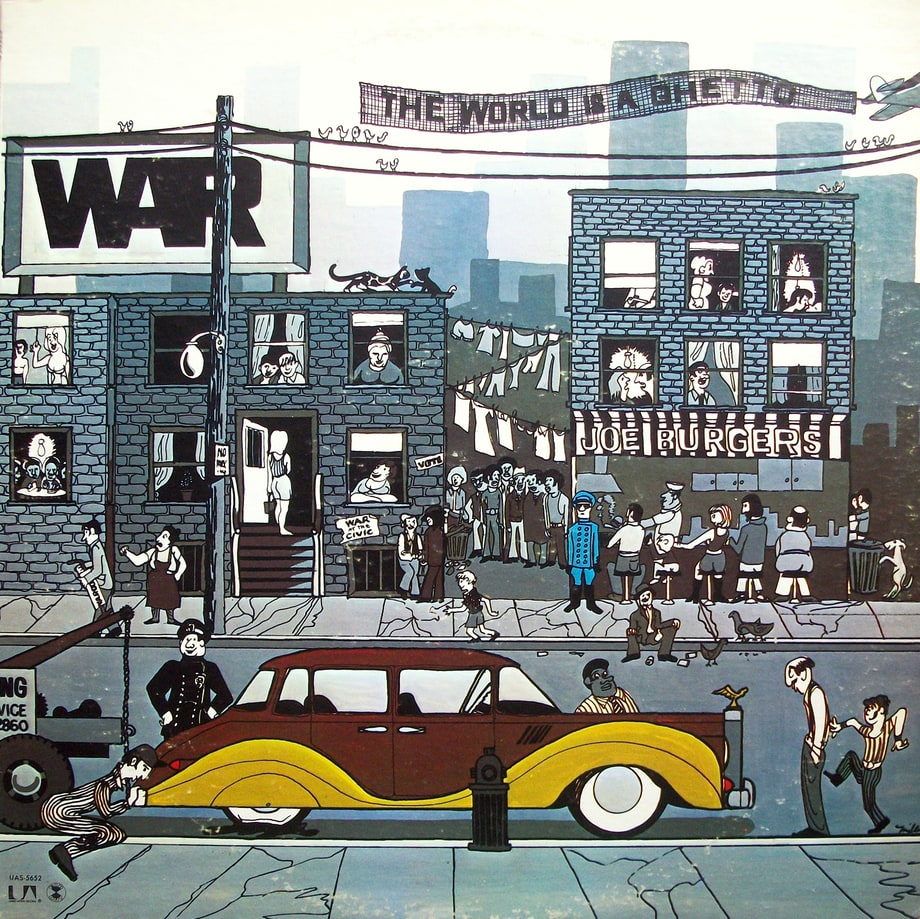United Artists 5652
Producer: Jerry Goldstein
Track listing: The Cisco Kid / Where Was You At / City, Country, City / Four Cornered Room / The World Is a Ghetto / Beetles in the Bog

February 17, 1973
2 weeks
War was on the map as the backing band for former Animals vocalist Eric Burdon. While Burdon was initially part of the British invasion, War was uniquely American, and a definite product of Southern California. After two albums with Burdon, the singer left, but the seven-member-strong War continued.
At first, things were shaky. War, released in 1971, barely dented the albums chart, topping out at number 190. But the follow-up, 1972’s All Day Music, fared significantly better, reaching number 16, proving that War could indeed stand on its own and setting the stage for The World Is a Ghetto.
War’s ability to find commercial acceptance without Burdon gave the group a newfound confidence and freedom, says producer Jerry Goldstein, who first experienced success as co-producer of the Angels’ 1963 Number One hit “My Boyfriend’s Back,” and later as a member of the Strangeloves.
Sensing that the band was at a creative high, Goldstein booked Crystal Studios in Los Angeles for 30 straight days, so that War’s momentum wouldn’t be interrupted. Although some of the material was rehearsed before entering the studio, most was created on the spot with spontaneous grooves, he says.
The World Is a Ghetto came at a turning point in War’s career. “War was really an accumulation of the past,” Goldstein says. “On All Day Music, they started to create things, but on The World Is a Ghetto they were forced to be spontaneous. They needed to make an album and they needed to be creative.”
The opening track, “The Cisco Kid,” was inspired by the late-’50s TV show of the same name. Guitarist Howard Scott came up with the concept on the steps of his Compton apartment. “It was really based on the fact that he was the only non-Anglo hero in late ’50s and ’60s that they could relate to,” Goldstein says. “Every other superhero was white.”
The public not only related to the sentiments of “The Cisco Kid,” but also to its infectious Latin groove, as the single became War’s biggest hit, reaching number two. The band later presented Duncan Renaldo, the man who portrayed the Cisco Kid on TV, with a gold record.
Although six out of the seven members of War were African-American and the seventh Danish, the group specialized in Latin rhythms and would later score a hit with “Low Rider,” a song that would become an anthem for the Latino car culture.
War was also known for its social commentary in such cuts as “The Worid Is a Ghetto” and “Four Cornered Room.” Yet for many, the music was as important as the message. Goldstein still remembers recording the title track. An edited version of the 10-minute song was released as a single and reaches number seven. Says Goldstein, “When Charles Miller played that sax solo, I cried. I had never heard anybody with that kind of feeling and soul. I sat in the studio at the end of the night and listened to it over and over again until the morning.”
THE TOP FIVE
Week of February 17, 1973
1. The World Is a Ghetto, War
2. No Secrets, Carly Simon
3. Talking Book, Stevie Wonder
A. Rhymes & Reasons, Carole King
5. Hot August, Night Neil Diamond
